- "Albus Dumbledore was never proud or vain; he could find something to value in anyone, however apparently insignificant or wretched, and I believe that his early losses endowed him with great humanity and sympathy. I shall miss his friendship more than I can say, but my loss is as nothing compared to the wizarding world's. That he was the most inspiring and the best loved of all Hogwarts headmsters cannot be in question. He died as he lived: working always for the greater good, and to his last hour, as willing to strech out a hand to a small boy with dragon pox as he was on the day that I met him."
- — Elphias Doge[src]
Professor Albus Percival Wulfric Brian Dumbledore (Summer[2] 1881 - June 1997) was the Head of Gryffindor House; Transfiguration Professor; Deputy Headmaster and later Headmaster of Hogwarts School of Witchcraft and Wizardry, Order of Merlin, First Class; Supreme Mugwump of the International Confederation of Wizards, Chief Warlock of the Wizengamot, and Grand Sorcerer. He was considered to be the most powerful wizard of his time. He was most famous for his defeat of Gellert Grindelwald, the discovery of the twelve uses of dragon's blood, and his work on alchemy with Nicolas Flamel.
It was through Dumbledore that resistance to the rise of Lord Voldemort was formed, as it was he who founded and led both the first and second Order of the Phoenix. Because of his keen mind and legendary power, Dumbledore became the only wizard that Voldemort ever feared. He was the master of the Elder Wand from 1945 until his arranged death in 1997 and considered by many as the greatest Headmaster to ever grace Hogwarts. Though he was no longer alive at the time, it was through Dumbledore's machinations that Voldemort was ultimately defeated and peace restored to the wizarding world.
Biography
Early Life
- "...my rough, unlettered, and infinitely more admirable brother."
- — Albus Dumbledore on Aberforth Dumbledore[src]
Albus Percival Wulfric Brian Dumbledore was born to Kendra and Percival Dumbledore in the summer[2] of 1881, in the mainly wizarding village of Mould-on-the-Wold. The early years of Dumbledore's life were marked by tragedy when his younger sister, Ariana Dumbledore, was attacked by a group of Muggle boys who saw her performing Magic and were frightened by what they saw.
Ariana Dumbledore was left mentally and emotionally scarred by the event and her magical powers were left severely altered and would manifest themselves on rare occasions usually in random or destructive ways. Albus' father, Percival Dumbledore, was heartbroken and set out in search of his own brand of justice. He located the Muggle boys and attacked them, as they had his daughter. It is unknown exactly what he did to them, but it might be assumed he probably used the Cruciatus Curse on them as he was sentenced to life in Azkaban for the crime, and would later die there.[3]
To escape the accusing eyes of the wizarding world, Kendra Dumbledore moved her young family to the village of Godric's Hollow which, like Mould-on-the-Wold, was a mainly wizarding village. Kendra rebuffed all her neighbours, with the eventual exception of Bathilda Bagshot, preferring to be left alone: and Albus learned not to mention his sister or father in public.[3]
Studies at Hogwarts
- "By the end of his first year, he would never again be known as the son of a Muggle-hater, but as nothing more or less than the most brilliant student ever seen at the school."
- — Elphias Doge[src]
Dumbledore's first year at Hogwarts School of Witchcraft and Wizardry was met by much whispering about his father's crime. Many of Albus's fellow students mistakenly believed that, like father like son, Albus too hated Muggles. Some praised his father's actions hoping to gain his trust, but they would not find favour with the young Dumbledore this way. Though later in his young life, under the influence of his love for Gellert Grindelwald, some anti-muggle prejudice did develop, he soon saw the error of his intent during his first battle with Gellert Grindelwald that ended with the sacrifice of Albus' sister, Ariana Dumbledore.[3]
He befriended a young Elphias Doge on his first day at Hogwarts, Doge was suffering from Dragon pox at the time which discouraged most from approaching him, Dumbledore however demonstrates his uncommon kindness by looking past the surface at finding inner beauty in people. Dumbledore also became very well connected during his Hogwarts years, making notable friends such as Nicolas Flamel, Bathilda Bagshot and Griselda Marchbanks who marked him in his N.E.W.T.s for Charms and Transfiguration where she later recollects that he did things with a wand that she had never seen before.[3]
During his school years, Dumbledore had won the Barnabus Finkley Prize for Exceptional Spell-Casting, became the British Youth Representative to the Wizengamot, and received the gold medal for Ground-Breaking Contribution to the International Alchemical Conference in Cairo.[3]
Dumbledore was made a Prefect during his Fifth year and was made Head Boy in his Seventh Year.
Tragedy and Friendship
- "So that, when my mother died, and I was left the responsibility of a damaged sister and a wayward brother, I returned to my village in anger and bitterness. Trapped and wasted, I thought! And then, of course, he came."
- — Albus Dumbledore to Harry Potter[src]
After graduating from Hogwarts, Dumbledore planned to take the traditional "Grand Tour" of the world with his friend Doge. However tragedy ensued on the eve of the departure when Kendra Dumbledore was killed by an outburst of Ariana's uncontrollable magic, leaving Albus the head of his own broken family.
Albus returned to Godric's Hollow full of bitter resentment at his situation, feeling trapped and wasted. Fortune finally shone on Dumbledore in the form of Gellert Grindelwald, who was in Godric's Hollow to research the Deathly Hallows. Dumbledore was fascinated by Grindelwald's ideas of wizarding domination and also harbored romantic feelings for the other boy.[3]
However, after two months, Dumbledore's brother Aberforth confronted him over his neglect of Ariana. Grindelwald lost control during the argument, and a duel between the three erupted that ended with the death of Ariana. Grindelwald fled immediately and Dumbledore was devastated.[3]
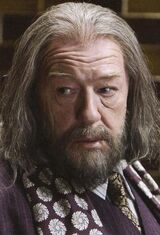
Albus Dumbledore circa 1937, at age 56, paying a visit to Tom Riddle at Wool's Orphanage.
Career at Hogwarts
- Dumbledore: "I had proven, as a very young man, that power was my weakness and temptation. I was safer at Hogwarts. I think I was a good teacher."
- Harry: "You were the best."
- — Albus Dumbledore and Harry Potter[src]
After this Dumbledore returned to Hogwarts School of Witchcraft and Wizardry as Professor of Transfiguration. He later became Deputy Headmaster, in which capacity he also served in recruiting students for the school. Most prominent among the students he recruited was Tom Riddle, who would eventually take on the name Lord Voldemort.[4]
However, as Dumbledore was educating young wizards and witches, Gellert Grindelwald was still at large in Europe, building up an army, and had already found one of the Deathly Hallows, the Elder Wand, which he used to terrorize Europe. Dumbledore was afraid to face Grindelwald, not because he thought he couldn't defeat him, but because he was afraid that Grindelwald could reveal to him who had truly killed Ariana. However, by 1945 Dumbledore could no longer turn a blind eye to Grindelwald's deeds, and tracked his old friend down. He duelled Grindelwald in what later became known as a legendary duel. Dumbledore defeated Grindelwald despite Grindelwald's possession of the Elder Wand. Dumbledore had Grindelwald imprisoned in Nurmengard and claimed the Elder Wand for himself.[3]

Albus Dumbledore as Professor of Transfiguration.
After the death of Armando Dippet Dumbledore was appointed Headmaster of Hogwarts. During this time, he was offered the position of Minister for Magic several times, but he turned down the offer every time, remembering how his quest for power had been his weakness in the past.
Shortly before or after the beginning of the First Wizarding War, Lord Voldemort approached Dumbledore with the same request he had proposed to Armando Dippet before him: to be allowed to return to Hogwarts as a teacher. Dumbledore, who knew of Voldemort's illicit activities since leaving Hogwarts, denied his application. This led to Voldemort cursing the position of Defence Against the Dark Arts Professor, preventing anyone from holding the position for more than a school year.
First Wizarding War
- Severus: "Hide them all, then. Keep her – them – safe. Please."
- Dumbledore: "And what will you give me in return, Severus?"
- Severus: "In – in return? Anything."
- — Severus Snape to Dumbledore[src]
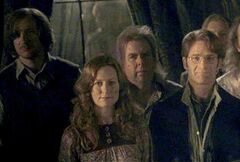
Dumbledore and some other members of the original Order.
After Lord Voldemort started his first rise to power in 1970 Dumbledore founded the Order of the Phoenix, a secret organization of witches and wizards willing to risk their lives to fight Voldemort and his Death Eaters. As the only wizard Voldemort was ever truly afraid of he was the perfect leader of the organization and was a significant contributor to the fight against Voldemort.
Later on in the war, Dumbledore was approached by another person who also wanted a job at Hogwarts: Sybill Trelawney, who auditioned to become the new Professor for Divination, lessons that Dumbledore disliked and barely considered a part of necessary education for young witches and wizards. When he was interviewing Sybill Trelawney at the Hog's Head, he came to the conclusion that she was not a real Seer. However, as Dumbledore was about to leave, Trelawney fell into a real trance and made a prophecy about the birth of the one that would have the power to vanquish the Dark Lord, who would be born to those "who have thrice defied him, born as the seventh month dies".[5] This astonished Dumbledore, but as it turned out, the Death Eater Severus Snape had overheard most of the prophecy, but had been caught in the act of spying and ejected from the tavern by Aberforth Dumbledore.[4]
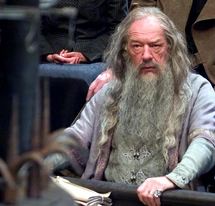
Albus Dumbledore in 1981, at age 100, during the trial of Igor Karkaroff.
Later, Severus Snape approached Dumbledore, having already told Voldemort about the prophecy. Snape was shocked by the fact that Voldemort had concluded that the prophecy was about Harry Potter, the son of James Potter, and Snape's own loved childhood friend, Lily Evans. Dumbledore made arrangements to ensure the safety of the three; he advised them to stay hidden in their house in Godric's Hollow, which was protected by a Fidelius Charm. However, their Secret-Keeper (believed by Dumbledore and everyone else to be Sirius Black, but was in truth Peter Pettigrew) betrayed them, resulting in James and Lily's deaths on Voldemort's hands. However, as Voldemort attempted to kill Harry, the curse backfired due to Lily Potter's love for her son and destroyed his body, only keeping a part of his soul alive.
Dumbledore, who likely already knew by then that a part of Voldemort's soul had concealed itself within Harry, made sure that Harry would be kept safe with his family, the Dursley's, as his spells ensured that Voldemort could not harm Harry there as long as he could have a home with them. He convinced Snape to help him protect Harry although Dumbledore secretly planned to allow Voldemort to kill Harry in the end, which would destroy the piece of Voldemort's soul inside Harry. Dumbledore gave Snape employment at Hogwarts as the Potions Master, and later defended Snape against the Ministry of Magic, who were rounding up and arresting remaining Death Eaters.
Shortly before the Potters' death, Dumbledore had borrowed something from James: James's Invisibility Cloak, something that Dumbledore saw was a part of the Deathly Hallows. Although Dumbledore had long given up his desire to unite the Hallows and become Master of Death, he could not resist the thought of studying the Invisibility Cloak. But when they were killed, Dumbledore suddenly had two of the Deathly Hallows under his possession. Only the Resurrection Stone was left.[3]
Life between the Wars
- Dumbledore: "Harry, do you know why...Professor Quirrell couldn't bear to have you touch him? It was because of your mother. She sacrificed herself for you. And that kind of act leaves a mark... This kind of mark cannot be seen. It lives in your very skin."
- Harry: "What is it?"
- Dumbledore: "Love, Harry. Love."
- — Albus Dumbledore to Harry Potter[src]

Albus Dumbledore delivers Harry Potter with Minerva McGonagall.
Ten years later, Harry started attending Hogwarts, as happy as Dumbledore had hoped (with a few exceptions), and alive and well. During that time, Dumbledore's friend Nicolas Flamel had asked Dumbledore to keep the Philosopher's Stone in Hogwarts, fearing that someone was plotting to steal it. Dumbledore and several teachers at Hogwarts planted magical security methods to protect the stone. Dumbledore used the Mirror of Erised to contain the Philosopher's Stone, only to be removed by someone who did not intend to use it. Dumbledore suspected that the Defence Against the Dark Arts Professor Quirinus Quirrell was behind the plot to steal the Philosopher's Stone, while working for the weakened Lord Voldemort, and as such he asked Snape to keep an eye on him.[6]
In the end it was Harry who protected the Philosopher's Stone from Quirrell and Voldemort, who planned to rise again using the stone's powers. Voldemort failed for the same reasons he had failed to kill Harry previously: Due to Lily Potter's love for Harry. When Harry recovered in the Hospital Wing, he questioned Dumbledore about why Voldemort had tried to kill him as a baby. Dumbledore did not believe that Harry was ready to know the truth about the prophecy Sybill Trelawney had made, and told him he would know when he was older.
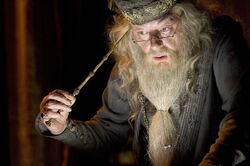
Albus Dumbledore withdrawing memories using the Elder Wand.
The year after, Dumbledore was temporarily removed from his position as Headmaster due to the second opening of the Chamber of Secrets. Dumbledore returned to his position after Harry uncovered that a memory of Tom Marvolo Riddle, hidden within his old diary was behind the opening of the chamber.[7]
The year after, the Ministry of Magic took it upon itself to increase security around Hogwarts. Sirius Black, who had been sentenced to life in Azkaban for murdering Peter Pettigrew and several muggles with a single curse, had escaped from the wizarding prison. The Ministry of Magic, afraid that he was going after Harry, placed a large number of Dementors at Hogwarts to try to recapture him. Dumbledore reluctantly tolerated the Dementors on school grounds, but refused to allow them within the school itself.[8]
As the school year drew to its close, it became clear to Harry and his friends that Sirius Black had been framed for his crimes. But Sirius was captured and sentenced to the Dementor's Kiss. Dumbledore believed Harry and his friends about Sirius's innocence, but was incapable of over-ruling the Ministry's decision. However, he told Hermione to use her time turner to save Sirius. The rescue was a success, and the Dementors were removed from the grounds for their attack on Harry.[8]
Second Wizarding War
Dumbledore's final years at Hogwarts were rocky due to the circumstances surrounding Lord Voldemort's second rise to power. The death of student Cedric Diggory during the Triwizard Tournament compelled Dumbledore to announce the return of Lord Voldemort and to reform the Order of the Phoenix. The Ministry of Magic balked at this news and Dumbledore was removed from the position of Headmaster, and forced into hiding. The position of Headmaster was then temporarily usurped by Dolores Umbridge. Some time afterwards, Dumbledore duelled Voldemort in the Ministry of Magic itself, but was unable to capture him. Shortly afterwards, Dumbledore's truth was recognized and he was reinstated as Headmaster in time for the Second Wizarding War to break out in Britain.

Albus Dumbledore battling the Inferi.
Later on, Dumbledore made it his business to try and find out about Lord Voldemort's past. He did this by questioning people who had known him as a child and a teenager, and obtained Voldemort-related memories from them. He collected memories from Bob Ogden, Morfin Gaunt, Horace Slughorn and the house-elf Hokey. Using these memories, along with some of his own, he discovered that Voldemort had created six Horcruxes, and also figured out what they could be: Tom Riddle's Diary, Gaunt's Ring, Helga Hufflepuff's Cup, Salazar Slytherin's Locket, the snake Nagini and an object of Rowena Ravenclaw's, later revealed to be her lost diadem.
The Locket and Death
- "To the well-organized mind, death is but the next great adventure. "
- — Albus Dumbledore
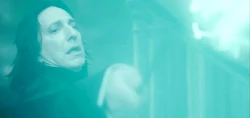
Snape using Avada Kedavra to end Dumbledore's life.
During the Second Wizarding War, Dumbledore tracked one of Voldemort's Horcruxes down in the abandoned house of the Gaunts. When he found the Horcrux, a ring formerly owned by Marvolo Gaunt, he saw that the stone in the ring was yet another one of the Deathly Hallows. This stone, according to legend, had the power to revive the dead (but in reality, a spiritual form of the person was brought back). His desire to see his family overrode his common sense and he placed the ring on his finger, the ring however had been cursed by Voldemort, as the curse spread, he quickly returned to Hogwarts.
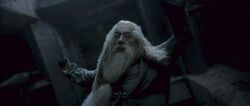
Albus Dumbledore falling from the Tower after Severus Snape casted the Killing Curse on him.
The skills of Severus Snape managed to trap the curse in Dumbledore's hand, but warned Dumbledore that it would eventually spread to the rest of his body. Knowing that the curse would kill him, Dumbledore asked Snape, that when the time came, Snape would be the one to end Dumbledore's life. Snape later objected to the plan, but was reminded by Dumbledore that it was the only way to save him great suffering. After a school year of the curse overtaking his body, and his body horribly wounded by the Emerald Green Potion of the Horcrux Cave, Snape finally killed Dumbledore with the Unforgivable Curse, Avada Kedavra.
Albus Dumbledore died at 116 years of age. One might wonder how long his natural life would have been otherwise, had it not been revealed in The Deathly Hallows he would not have lived another few months past his murder due to the curse sustained in his hand from his contact with the cursed ring of Marvolo Gaunt. He is survived by his brother, Aberforth Dumbledore, at age 114 at the end of the Battle of Hogwarts. It is unknown how long Aberforth survived, but due to the extremely elongated life spans of the Dumbledore brothers, it seems he may have lived many years past.
The Afterlife

Dumbledore's portrait.
- "My dear boy, I have no idea. This is, as they say, your party."
- — Albus Dumbledore speaks to Harry Potter in death
After his death, his reputation was smeared somewhat by Rita Skeeter, who wrote an insulting biography called The Life and Lies of Albus Dumbledore. This depicted him in several nasty ways, including suggesting that he delayed his attack on Gellert Grindelwald because he still held lingering affection for him.
Despite dying, this was not the last time that Harry saw Dumbledore. After finding out he was one of Voldemort's Horcruxes (Voldemort having accidentally made him one the night he tried to kill him), Harry bravely walked into Voldemort's camp to be killed. But Voldemort's Killing Curse once again failed to kill Harry.
Instead, Harry entered a limbo state where he spoke with Dumbledore's spirit. Dumbledore explained to Harry everything he had not told him when he was alive: the Deathly Hallows, his friendship with Gellert Grindelwald, and a number of other things.
After he was done explaining everything, Dumbledore and Harry parted ways: Harry returning to the mortal world and Dumbledore boarded a train, and left the world forever. His portrait remains at Hogwarts. Harry and Ginny Weasley's second son is named Albus Severus Potter, after Dumbledore.
Physical appearance
Albus Dumbledore, a great wizard.
- "You know, Minister, I disagree with Dumbledore on many counts... but you cannot deny he's got style..."
- — Phineas Nigellus[src]
Albus Dumbledore was tall and thin, with long silver hair and a long beard (auburn in his earlier years). He had brilliant blue eyes, which usually twinkled with kindness and mischief. During the few times he became angry, his eyes would burn with a cold blue fire that made even Lord Voldemort falter. His eyes were also described as 'piercing' the viewer.
Dumbledore had a long and crooked nose, which looked as if it had been broken at least twice. (It is speculated that Aberforth Dumbledore's punch during Ariana Dumbledore's funeral may have played a role in shaping Dumbledore's nose.) His fingers were also long and skilled with holding a wand. He wore half-moon spectacles and a colourful array of robes, from purple to crimson red. He once claimed to have a scar above his left knee in the precise shape of a map of the London Underground, whether or not he actually does is unknown.
Personality and traits
Dumbledore proves to Tom Riddle that he is a wizard.
- "Albus Dumbledore was never proud or vain; he could find something to value in anyone, however apparently insignificant or wretched, and I believe that his early losses endowed him with great humanity and sympathy. I shall miss his friendship more than I can say, but my loss is as nothing compared to the wizarding world's. That he was the most inspiring and the best loved of all Hogwarts headmasters cannot be in question. He died as he lived: working always for the greater good, and to his last hour, as willing to stretch out a hand to a small boy with dragon pox as he was on the day that I met him."
- — Elphias Doge[src]
Considered the most powerful wizard in the world, Dumbledore was benevolent and eccentric, an archetypal good wizard in the style of Merlin. It is said that he is the only wizard Lord Voldemort ever feared.
Dumbledore's Chocolate Frog card mentions that he enjoyed chamber music and ten-pin bowling. The card also reveals that he had a sweet tooth for treats both magical and non-magical. He frequently set the password for the entrance to the Headmaster's office to the name of one of his favourite sweets. However, he disliked Bertie Bott's Every Flavour Beans after coming across a vomit-flavoured bean in his youth. He was a fan of knitting patterns and once told Harry that one could never have enough woollen socks. His favourite flavour of jam was raspberry[HP6].
As a supremely talented wizard, Dumbledore showed numerous examples of extraordinary powers. His abilities as a wizard were combined with a kind of cunning and subtlety of mind that allowed him to comprehend human nature and turn the better aspects of humanity (trust, love, and friendship) to Voldemort's disadvantage in particular. Yet despite his many talents and accomplishments, Dumbledore was never in the least arrogant, self-important or pompous and in this he stands above the other great wizards of his day. Despite this fact, however, Dumbledore was quite aware of the fact that his power outmatched everyone else's, and would not hesitate to remind others of this fact, if the situation demanded it.
Dumbledore believed in the good in everyone. For example, he hired Sybill Trelawney as a Divination professor even though her abilities as a seer were scant because he recognized a real, if highly sporadic, gift of prophecy. Similarly, he hired Rubeus Hagrid as Hogwarts Gamekeeper after he was expelled because he had no family to turn to. Additionally, Remus Lupin, a werewolf, was given education, and later temporary employment, at Hogwarts despite the potential backlash from the public, if they were to find out. Dumbledore believed each of these people had goodness within them and encouraged their goodness to come out.

Albus Dumbledore in thought.
His knowledge of people's true personality appears to go beyond being simply a good judge of character. Despite Snape's background as a Death Eater, and despite strong incriminating evidence, Dumbledore trusted him with many important tasks. In addition to Dumbledore's great trust in the power of the human spirit, he also had a deep understanding of the power of love. This perhaps stemmed from his "great tragedy" of his affections for Gellert Grindelwald, whom Dumbledore not only loved, but greatly admired for his innovative ideas.
Dumbledore showed Petunia Dursley love when, during her childhood, he sent her a personal letter tenderly explaining why she would not be admitted to Hogwarts along with her sister Lily Evans. It is exceptional that a Headmaster would send a Muggle girl such a gesture of kindness.
Although he tells Harry that what he saw in the Mirror of Erised is himself holding a pair of thick socks, something no one ever gives him as a present, what Dumbledore saw is in fact his mother and sister living, his father free and living, and his brother on once more established terms with him [9]. Dumbledore's sorrow for the pain in his family reveals his great love for them.
Dumbledore admits to Harry that he has also withheld from him knowledge of Sybill Trelawney's prophecy which marked Harry as the only wizard who could destroy Voldemort. He did so out of love, in an effort to protect Harry from fear in his childhood. This was the same reason for which he hid Harry's true identity from him during his early life with the Dursleys.
Dumbledore continually reminded Harry that love is the greatest magic of all. After one such reminder, Dumbledore immobilised Harry to save him before Dumbledore is killed by Severus Snape.
Dumbledore is known for his odd displays of his whimsical sense of humour. This humour is sometimes considered inappropriate by some of the other teachers, such as Professor Minerva McGonagall, who is serious at all times. Dumbledore uses humour to include people and make them feel more comfortable in his presence.
Dumbledore's personality flaw, which he explained to Harry in 1998[HP7], was his desire for power. Although he only ever desired to use this power for good, he found that those best suited for power are those who do not desire it. The prime example of his desire for power was be when he and Gellert Grindelwald made plans one summer to take over the Muggle world, despite his own misgivings, and re-establish wizards as the natural rulers of the world. Dumbledore fell from this fantasy after his beloved sister Ariana Dumbledore was killed during a duel between himself, Aberforth Dumbledore, and Grindelwald.
Dumbledore was also haunted by his sad family life, most particularly the death of his sister, which would ultimately lead to his death. When he discovered Gaunt's Ring and realised it contained the Resurrection Stone, he was overwhelmed by his desire to see the deceased members of his family once more. Completely forgetting that the Ring had become a Horcrux, and so was likely to be cursed, Dumbledore put it on, triggering the curse that would have killed him, had he not asked Severus Snape to make it quick for him.
Magical powers and abilities
- "...examined him personally in Transfiguration and Charms when he did NEWTs...did things with a wand I'd never seen before."
- — Griselda Marchbanks[src]
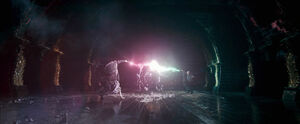
Albus Dumbledore locked in combat with Voldemort.
Magic Mastery: Albus Dumbledore was considered by many to be the most powerful wizard of his time and he lived up to this title on many occasions. After his first year at Hogwarts he was considered nothing more or less than the most gifted student the school would ever see. Dumbledore was known to be prodigiously talented magically, and was admittedly more skilful than the second most powerful Dark Wizard of all time Gellert Grindelwald.[3] He was also the only wizard to ever be feared by the greatest Dark Wizard of all time, Lord Voldemort, who he forced into retreat during their only known duel.[5] Some of Dumbledore's many talents were:
Patronus Messaging: Dumbledore devised a method of sending messages via Patronus, a skill he taught only to members of the Order of the Phoenix.
Genius-level intellect: Dumbledore was not only the most powerful wizard(arguable only when compared to Lord Voldemort) of his time, but was also a genius who possessed a superior intellect, and devised a elaborate master plan to defeat the seemingly unbeatable Lord Voldemort. This is seen quite predominantly during the events of Deathly Hallows, when Dumbledore, through various strategical plans and an almost Machiavellian manipulation of key persons (such as Severus Snape) before his death, is able to set the path for Harry Potter to locate Lord Voldemort's Horcruxes. His intellect, or at least his strategical thinking, far outstrips any other character in the series, and is one of his key talents.
Invisibility: He claimed the ability to render himself invisible without the use of an Invisibility Cloak. To achieve such a state, Dumbledore merely used an extremely powerful Disillusionment Charm.[10] He was also capable of using Homenum Revelio, wandless,[11] to detect the presence of people who were invisible.
Occlumency/Legilimency Expert: Dumbledore was also skilled in Occlumency and Legilimency. Many people, particularly Harry Potter, often noted that Dumbledore sometimes seemed to see right into their mind and correctly decipher what they were thinking.[5] Some people argue that this ability to delcipher people's thoughts is merely due to Dumbledore's vast experience and superior intellect, rather than any means of magic.
Wandless/Non-Verbal Magic Expert: He could produce magic without the use of a wand, and was highly skilled at nonverbal magic. While some people, such as Antonin Dolohov, as seen during the Battle of the Department of Mysteries,[5] seemed to produce lesser magic when using it non-verbally, Dumbledore was capable of extraordinary feats such as conjuring hundreds of squishy purple sleeping bags to accommodate the students of Hogwarts, without saying a word.[8] Whilst in the Horcrux Cave, Dumbledore proved capable of foiling the defences set up by Lord Voldemort, using wandless magic. He also performed the extraordinary spell Arresto Momentum, without a wand, to save Harry from falling to his death at the hands of the Dementors. He could also light and put out candles, both with the wave of his hand. [4]
Signature spells: Dumbledore was known for having created unique magical spells and devices. In particular he was the only known user of a spell that stuns several people at once, bearing the sound of a gunshot; he also used a spell in the Battle of the Department of Mysteries to yank a fleeing Death Eater back to him with zero physical effort.
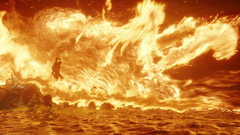
Dumbledore using mass amounts of fire to fight off Inferi and protect Harry Potter.
Fire Magic Affinity: His weapon of choice appeared to be fire. In his duel against Voldemort he used a fiery rope; when he displayed his Wizarding powers to young Tom Riddle, he did so by setting Riddle's wardrobe on fire, without actually burning anything; he once used a vast amount of fire to hold off a throng of Inferi. He is known to be able to conjure Gubraithian Fire. His magical familiar, Fawkes, is a phoenix, which dies and is reborn in flames. Although Dumbledore favored fire, during the Battle of the Department of Mysteries he used water to encase Voldemort.
Master Duellist: Dumbledore was an exceptionally skilled duellist, capable of capturing several Death Eaters at once and duelling Lord Voldemort during the Battle of the Department of Mysteries. But his duelling skills were shown at their best when he defeated Gellert Grindelwald, who was wielding the Elder Wand (eyewitnesses claimed it was the greatest duel ever fought between wizards).
Dumbledore used a Pensieve as a means to study the past in greater depth. He used his stored memories to study the history of the Horcruxes and their creation.
Magical Multilingualist: Among all these talents, Dumbledore also possesses the ability to speak Mermish[HP4] and Gobbledegook. He can recognize Parseltongue, the language of snakes, as he demonstrates while he and Harry are inside Bob Ogden's stored memory; he is able to quote verbatim a Parseltongue phrase uttered by Morfin Gaunt in a later stored memory.[HP6]
While he was by no means vain, Dumbledore also exhibited no false modesty, readily acknowledging that he was unusually intelligent and an exceptionally powerful wizard. He admitted that he made the occasional mistake, and since he was rather more clever than most, his mistakes tended to be "correspondingly huger".
Potioneer: Dumbledore is also proficient at Potions, as, according to the obituary written by Elphias Doge, his papers were published in The Practical Potioneer.
Charms master: He is known to be a master in Charms, as, his papers were published in Achievements in Charming.
Career Accomplishments
Dumbledore fighting Voldemort
Albus Dumbledore was a famous alchemist who has worked with Nicolas Flamel, the only known maker of the Philosopher's Stone and was trusted in ensuring that this stone was well protected. Dumbledore was credited with discovering the twelve uses of dragon's blood. He was also capable of conjuring a Patronus, one that took the form of a phoenix.
Dumbledore became the Chief Warlock of the Wizengamot and Supreme Mugwump of the International Confederation of Wizards. He was removed from these posts during his conflict with the Ministry of Magic under Minister for Magic Cornelius Fudge, but was reinstated when the Ministry was forced to concede that he had correctly warned that Voldemort had returned. He holds the Order of Merlin, First Class, for Grand Sorcery.
Relationships

Dumbledore's younger sister, Ariana.
Family
Ariana Dumbledore
- "They say he feared me, and perhaps he did, but less, I think, than I feared him... You see, I never knew which of us, in that last, horrific fight, had actually cast the curse that killed my sister... I dreaded beyond all things the knowledge that it had been I who brought about her death, not merely through my arrogance and stupidity, but that I actually struck the blow that snuffed out her life. I think he knew it, I think he knew what frightened me."
- — Albus Dumbledore to Harry Potter about his guilt over Ariana's death[src]
Albus Dumbledore was Ariana Dumbledore's eldest brother, and was not nearly as close to his younger siblings as they were to each other. Although he loved his younger sister, Albus was resentful when he had to take responsibility for her after their mother's death, which forced him to stay at home, and thus abandon his ambitious plans. When he and Gellert Grindelwald made plans to subjugate Muggles and take power in the wizarding world, Albus planned to bring Ariana with them, but Aberforth pointed out that she was in no state to go. This launched a three-way duel between the brothers and Grindelwald, and Ariana was accidentally killed in the fray. For the rest of his life, Albus lived with guilt over the part he played in her death, and with the fear that it had been him to kill her.[12]
From then on, Albus's Boggart would be Ariana's corpse, and in the Mirror of Erised, he could see his family alive, well, and together[13].
Aberforth Dumbledore
Aberforth, his brother.
- "They were not alike: Aberforth was never bookish and, unlike Albus, preferred to settle arguments by dueling rather than through reasoned discussion... In fairness to Aberforth, it must be admitted that living in Albus's shadow cannot have been an altogether comfortable experience."
- — Description of the Dumbledore brothers[src]
Aberforth Dumbledore was Albus' younger brother. The two brothers are not close to each other and became worse after the tragic death of their younger sister, Ariana. Albus was heartbroken and Aberforth blamed him for Ariana's death. Aberforth only change his opinion of his brother when Harry Potter help him realized what Albus' intention really was. He participated in the Battle of Hogwarts, in which he helped the students and faculty of Hogwarts and the Hogsmeade residences to protect the school on where Albus served as Headmaster for almost half of his lifetime, from Lord Voldemort, as well as to allow Harry time to find the what he thought to be the last Horcrux.
Gellert Grindelwald
- "Did I know, in my heart of hearts, what Gellert Grindelwald was? I think I did, but I closed my eyes."
- — Albus Dumbledore to Harry Potter, about his friendship with Gellert Grindelwald[src]
Dumbledore first met Gellert Grindelwald when he was seventeen. They were introduced by Grindelwald's great aunt, Bathilda Bagshot. They got along almost instantly, according to Bagshot. They were ultimately united by their desire to have the Deathly Hallows. It has been stated that Dumbledore had infact romantic feelings towards Grindelwald, although it is unsure whether or not Grindelwald shared this affection. They got along for two months until Aberforth, Dumbledore's brother, confronted them over the neglect of Ariana Dumbledore. Grindelwald lost control during the argument and attacked Aberforth. Dumbledore rushed forward to defend his brother, and during the duel Ariana was killed. Grindelwald fled and Dumbledore ended their friendship.
Grindelwald spent a number of years gaining power in Europe while Dumbledore spent his time teaching young wizards at Hogwarts. While Grindelwald and his army terrorized Europe, Dumbledore refused to face him out of fear that Grindelwald knew who had really killed Ariana. But after five years, Dumbledore could no longer stand idly by, and went after his old friend. When Dumbledore found him, they engaged in the legendary duel of 1945, eyewitnesses saying no greater duel was ever fought between wizards. Dumbledore won in the end, and took possession of the Elder Wand and imprisoned Grindelwald in his own prison Nurmengard.
Years later in 1998, Grindlewald refused to give any information to Lord Voldemort about the Elder Wand despite the fact that he was imprisoned, wandless and face-to-face with the only Dark Wizard ever considered more powerful than himself. This seems to indicate that Grindlewald no longer held with the views of those who practiced the Dark Arts. It was speculated by Harry Potter that Grindlewald had given his life to prevent Voldemort from desecrating Dumbledore's tomb.
Tom Marvolo Riddle (Lord Voldemort)
- "The time is long gone when I could frighten you with a buring wardrobe and force you to make repayment for your crimes. But I wish I could, Tom, I wish I could..."
- — Albus Dumbledore[src]

Mrs Cole, Dumbledore and Tom.
Dumbledore had personally approached Mrs Cole, the caretaker of the orphanage in which Tom Riddle resided to enroll the latter in Hogwarts. Dumbledore had met Tom Riddle for the first time there and apparently was unaware that he had just met the most dangerous Dark Wizard of all time. He was however intrigued by Tom Riddle as his powers were surprisingly well-developed by such a young wizard who had begun to use them consciously. Dumbledore was also disturbed by the fact that Tom was a Parselmouth, a rare ability supposedly connected with the Dark Arts, although not as much as the fact that Tom had obvious instincts for cruelty, secrecy and domination. Dumbledore then returned to Hogwarts intending to keep an eye upon Tom Riddle, as he was alone and friendless, a dangerous situation.
- "Yes, I certainly do know that you have seen and done much since leaving us. Rumours of your doings have reached your old school, Tom. I should be sorry to believe half of them."
- — Albus Dumbledore[src]

Tom Riddle, now Lord Voldemort.
When Dumbledore was aware of Tom Riddle's transformation and rise to power, he still maintained contact with the latter, even allowing him to visit the school for a supposed job interview. In fact, Dumbledore intended to discuss with Tom about his true motive and to gently make him repent for his crimes.
It was clear that Dumbledore viewed Tom Riddle as a former student of his to be pitied for his childhood, and that he never understood love, as he had never received any. Dumbledore understood the evil in Tom as a result from a string of unfortunate events and performed intensive research on him, eventually discovering about his Horcruxes. After Riddle's transformation into Lord Voldemort, contrary to the rest of the wizarding community's fear of saying the Dark Lord's name, Dumbledore, as the only person Voldemort (secretly) feared, refused to be intimidated by the Dark Lord, referring to him as "Voldemort" to others and as "Tom" in conversation with Voldemort himself, a subtle but steadfast refusal to allow Lord Voldemort to dictate the terms of their relationship and a trait that would later be inherited by Harry Potter.
Harry Potter

Dumbledore with Harry searching Horcruxes.
- "Of course it is happening inside your head, Harry. But why on earth should that mean that it is not real?"
- — Albus Dumbledore[src]
Dumbledore was well known for his steadfast championing of Harry Potter. It was Dumbledore who arranged for the infant Harry to be rescued from the cottage at Godric's Hollow where Harry's parents had been murdered. He then left Harry in the care of Harry's Aunt Petunia and Uncle Vernon in Surrey. Throughout Harry's years at Hogwarts, Dumbledore provided him with protection and guidance, and supplemented Harry's schooling with additional training against the forces of Darkness.
By Harry's sixth year, Albus Dumbledore took on the role of providing Harry with additional insights into the origins of Lord Voldemort, as Voldemort's power was growing enormously stronger. He did this largely through the use of the Pensieve. He entrusted Harry with the task of getting a final, crucial memory from Horace Slughorn regarding Voldemort's knowledge of Horcruxes.
Harry and Dumbledore forged a strong mentor-pupil bond, comparable to that between two close family members (most likely case of a grandfather-grandson), in spite of the century in age difference. Harry felt comfortable enough around the impressive, intimidating figure of Dumbledore to shout at him in frustration, cry out of grief, admit to his fears, and entrust him with his life.
Before the final event of the Battle of Hogwarts, Harry was struck by the Killing Curse and nearly died back in the Forbidden Forest, his soul went to a place resembling King's Cross Station, where Dumbledore was waiting to speak with him. The fact that Dumbledore himself was there to meet Harry in a place between life and death attests to the bond of fellowship between them. After the war, Harry also named his second son after Dumbledore.
Rubeus Hagrid

- "I would trust Hagrid with my life."
- — Albus Dumbledore[src]
Dumbledore displays an innate trust of Rubeus Hagrid in every situation starting from when Hagrid attended Hogwarts. Dumbledore believes that Hagrid did not open the Chamber of Secrets and asks the former Headmaster Armando Dippet to train Hagrid as the gamekeeper so he could stay. Since that time Dumbledore has shown many examples of his faith in Hagrid. For example, Hagrid is the one tasked to protect Harry Potter as he is brought to live with the Dursleys, in addition he is asked to bring the Philosopher's Stone back from Gringotts. Dumbledore also sends Hagrid on other important missions, such as attempting to persuade the giants to join the side of the Order of the Phoenix.
Minerva McGonagall

Minerva McGonagall, friend and co-worker.
Minerva McGonagall knew Dumbledore for the majority of her life. She attended Hogwarts as a student during Dumbledore's time as the Transfiguration Professor and later went on to replace him when he took the position of Headmaster of the school. She served for many years as his Deputy Headmistress, standing in for him and even replacing him as Headmistress on several occasions.[7][4]
Minerva had great faith in Dumbledore, placing great stock in the differences between him and Voldemort.[6] However, she did not hesitate to disagree with him when she felt the need to do so. She greatly opposed his decision to place Harry Potter with Petunia Dursley and her family, calling them the "worst sort of Muggles imaginable."[14] She also served more than once to bring Dumbledore back on track when he became distracted from the matter currently at hand.[15]
Minerva had no qualms displaying her loyalty to Dumbledore. When Cornelius Fudge brought Aurors to arrest Dumbledore in 1996, she boldly stepped forward and announced her intention to fight the Aurors on his behalf. She only stepped back at Dumbledore's insistence when he reminded her that Hogwarts and her students would need her in his absence.[5]
Minerva was devastated when Dumbledore was killed in 1997 during the Battle of the Lightning Struck Tower, and attended his funeral.[4] A year later, when Harry Potter returned to Hogwarts on a mission given to him by Dumbledore, she did not question the decision of her dead friend, but immediately sought to provide whatever assistance she could.[3]
Etymology
Dumbledore's given names could be interpreted as representing the four primary divisions of the British Isles:
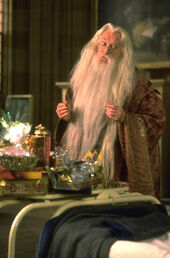
Albus Dumbledore the year that Harry Potter came to Hogwarts.
- 'Albus' may be the masculine form of "Alba", an ancient name for Scotland or an Italian word meaning "sunrise", possibly alluding to the rebirth symbols associated with him (see Phoenix). It is also a Latin word for white, and thus could be meant to invoke Good as traditionally associated with white, or merely to refer to his long white hair and beard.
- 'Percival' is a legendary Arthurian knight from Wales involved in the Grail quest. In Le morte d'Arthur by Thomas Mallory, Percival is both hero of the quest for the Grail and narrator of the tale, as is the case for Dumbledore in parts of the story. It is a name which presumably comes from his father.
- 'Wulfric' is an Anglo-Saxon name found in the Anglo-Saxon Chronicle and could be representative of England. Wulfric translates literally as "wolf-power", and is reminiscent of another similar name, Beowulf, which means "powerful wolf-bear". The legendary hero Beowulf slew the monster Grendel as a youth, a name similar to Gellert Grindelwald, the dark wizard Dumbledore defeated in his own youth. Beowulf was fatally wounded by a dragon in a sea cave, and the only one who would help him was his squire, an orphaned son of some loyal followers. This is a parallel to Dumbledore's life, as he was mortally injured by the potion protecting the fake Horcrux in a sea cave as well, and the orphaned son would of course be represented by Harry.
- 'Brian' is the name of the legendary Irish high-king and hero Brian Boru who defeated the Vikings at the Battle of Clontarf near Dublin. Dumbledore himself was a veteran of many wizarding battles against the forces of Darkness. However, this name was probably chosen because of its comic mundanity compared to his other four names.
'Dumbledore' is an old 18th century English word for 'bumblebee'. Rowling stated she imagined him flitting about the castle humming to himself.
- "Albus Dumbledore" could also be inspired from JK Rowling's old school head master, Alfred Dunn.
Behind the scenes
Albus Dumbledore in thought.
- In the first two Harry Potter films, Albus Dumbledore was played by actor Richard Harris. When Harris died of Hodgkin's Disease in 2002, Michael Gambon was cast in the part of Dumbledore, playing in Harry Potter and the Prisoner of Azkaban and all subsequent films. The young Dumbledore will be portrayed by Toby Regbo in the film adaptations of Harry Potter and the Deathly Hallows.[16]
- Sir Michael Gambon's portrayal of Dumbledore is noticeably different from both Richard Harris' and from the books'. In the books, Dumbledore is noted to have been very calm and collected in nearly all circumstances. He has also been known to have worn a pointy wizard's cap, long flowing robes, and have a lengthy untethered beard. However, Gambon's Dumbledore is somewhat different in that regard. Though still calm and collected most of the time, he tends to go a bit further into the emotional spectrum of his character, which can be seen clearly in Harry Potter and the Goblet of Fire, and Harry Potter and the Order of the Phoenix. His physical portrayal is also a bit different, opting for a slightly bohemian look, including a fez-like tassel hat along with long and flowing robes that seem to have subtle Indian/Arabian influences. His beard is also tied with a thread-like chain, the ends of which feature tiny bells. However, there are some ways in which Gambon's Dumbledore more closely fits the book's version than Richard Harris'. Harris, being much older than Gambon and more ill towards the end, shows much more signs of advanced age in his movement and voice, while in the books Dumbledore is described as having an energy and vigor of a man much younger. Dumbledore also takes part in several action-oriented scenes in both the Order of the Phoenix and Half-Blood Prince films that would have been more challenging with the less-mobile Harris in the role. Discounting the special case of Tom Riddle/Voldemort, Dumbledore is, to date, the only major character in the series to be recast in the films.
- In 2007, J.K. Rowling revealed that Dumbledore is homosexual, and harbored romantic feelings for Gellert Grindelwald. No comment was made upon Grindelwald's sexuality or whether Grindelwald returned his feelings, so the status of the relationship is unknown. Rowling also commented that "this added to Dumbledore's horror when Grindelwald showed himself to be what he was." This love was caused by Dumbledore meeting someone "as brilliant as he was." Only the subtlest of hints can be found in Deathly Hallows relating to this. Reportedly the earliest indication of Dumbledore's orientation came when Rowling vetoed a line of dialogue in one of the recent movie scripts that would have referenced a romantic involvement with a woman.
Appearances
- Wizard of the Month
- Harry Potter and the Philosopher's Stone (First appearance)
- Harry Potter and the Philosopher's Stone (film)
- Harry Potter and the Philosopher's Stone (game)
- Harry Potter and the Chamber of Secrets
- Harry Potter and the Chamber of Secrets (film)
- Harry Potter and the Chamber of Secrets (game)
- Harry Potter and the Prisoner of Azkaban
- Harry Potter and the Prisoner of Azkaban (film)
- Harry Potter and the Prisoner of Azkaban (game)
- Harry Potter and the Goblet of Fire
- Harry Potter and the Goblet of Fire (film)
- Harry Potter and the Goblet of Fire (game)
- Harry Potter and the Order of the Phoenix
- Harry Potter and the Order of the Phoenix (film)
- Harry Potter and the Order of the Phoenix (game)
- Harry Potter and the Half-Blood Prince
- Harry Potter and the Half-Blood Prince (film)
- Harry Potter and the Half-Blood Prince (video game)
- Harry Potter and the Deathly Hallows (as spirit and portrait)
- Harry Potter and the Deathly Hallows (film) (as spirit and portrait)
- The Tales of Beedle the Bard
- Harry Potter: Quidditch World Cup
Notes and references
- ↑ In an interview after the publication of Harry Potter and the Deathly Hallows, J.K. Rowling said that Hogwarts had a different Head by the time Harry Potter's children arrived in 2017, saying that Minerva was "getting on a bit". This is a bit odd, as Minerva would have been around ninety years old when Harry's children attended Hogwarts, and Dumbledore was 116 at the time of his death. Minerva did not seem the sort to take early retirement any more than Dumbledore was.
- ↑ 2.0 2.1 Dumbledore was described in Chapter 18 of Deathly Hallows as being near his 18th birthday at the time he left Hogwarts. Since his birthday did not fall during the school year (September 1 - mid-June), he must have been born in the summer, likely in either July or August, as he was still seventeen when he befriended Gellert Grindelwald.
- ↑ 3.00 3.01 3.02 3.03 3.04 3.05 3.06 3.07 3.08 3.09 3.10 Harry Potter and the Deathly Hallows
- ↑ 4.0 4.1 4.2 4.3 4.4 Harry Potter and the Half-Blood Prince
- ↑ 5.0 5.1 5.2 5.3 5.4 Harry Potter and the Order of the Phoenix
- ↑ 6.0 6.1 Harry Potter and the Philosopher's Stone
- ↑ 7.0 7.1 Harry Potter and the Chamber of Secrets
- ↑ 8.0 8.1 8.2 Harry Potter and the Prisoner of Azkaban
- ↑ in a recent web chat Jo Rowling
- ↑ The Tales of Beedle the Bard (real)
- ↑ [1]
- ↑ Harry Potter and the Deathly Hallows (chapter 35)
- ↑ MuggleNet transcript of Bloomsbury Webchat
- ↑ Harry Potter and the Philosopher's Stone (film)
- ↑ Harry Potter and the Goblet of Fire
- ↑ Deathly Hallows Casting Updates: Teen Dumbledore Cast, Chris Rankin Returns and More
